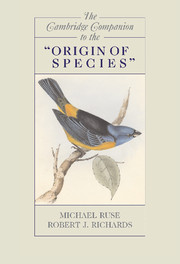Book contents
- Frontmatter
- Foreword
- Introduction
- 1 The Origin of the Origin
- 2 Darwin’s Analogy between Artificial and Natural Selection in the Origin of Species
- 3 Variation and Inheritance
- 4 Darwin’s Theory of Natural Selection and Its Moral Purpose
- 5 Originating Species: Darwin on the Species Problem
- 6 Darwin’s Keystone: The Principle of Divergence
- 7 Darwin’s Difficulties
- 8 Darwin’s Geology and Perspective on the Fossil Record
- 9 Geographical Distribution in the Origin of Species
- 10 Classification in Darwin’s Origin
- 11 Embryology and Morphology
- 12 Darwin’s Botany in the Origin of Species
- 13 The Rhetoric of the Origin of Species
- 14 “Laws impressed on matter by the Creator”? The Origin and the Question of Religion
- 15 Lineal Descendants: The Origin’s Literary Progeny
- 16 The Origin and Political Thought: From Liberalism to Marxism
- 17 The Origin and Philosophy
- 18 The Origin of Species as a Book
- Bibliography
- Index
4 - Darwin’s Theory of Natural Selection and Its Moral Purpose
Published online by Cambridge University Press: 28 January 2009
- Frontmatter
- Foreword
- Introduction
- 1 The Origin of the Origin
- 2 Darwin’s Analogy between Artificial and Natural Selection in the Origin of Species
- 3 Variation and Inheritance
- 4 Darwin’s Theory of Natural Selection and Its Moral Purpose
- 5 Originating Species: Darwin on the Species Problem
- 6 Darwin’s Keystone: The Principle of Divergence
- 7 Darwin’s Difficulties
- 8 Darwin’s Geology and Perspective on the Fossil Record
- 9 Geographical Distribution in the Origin of Species
- 10 Classification in Darwin’s Origin
- 11 Embryology and Morphology
- 12 Darwin’s Botany in the Origin of Species
- 13 The Rhetoric of the Origin of Species
- 14 “Laws impressed on matter by the Creator”? The Origin and the Question of Religion
- 15 Lineal Descendants: The Origin’s Literary Progeny
- 16 The Origin and Political Thought: From Liberalism to Marxism
- 17 The Origin and Philosophy
- 18 The Origin of Species as a Book
- Bibliography
- Index
Summary
Thomas Henry Huxley recalled that after he had read Darwin’s Origin of Species, he had exclaimed to himself: “How extremely stupid not to have thought of that!” (Huxley 1900, 1: 183). It is a famous but puzzling remark. In his contribution to Francis Darwin’s Life and Letters of Charles Darwin, Huxley rehearsed the history of his engagement with the idea of transmutation of species. He mentioned the views of Robert Grant, an advocate of Lamarck, and Robert Chambers, the anonymous author of Vestiges of the Natural History of Creation (1844), which advanced a crude idea of transmutation. He also recounted his rejection of Agassiz’s belief that species were progressively replaced by the divine hand. He neglected altogether his friend Herbert Spencer’s early Lamarckian ideas about species development, which were also part of the long history of his encounters with the theory of descent. None of these sources moved him to adopt any version of the transmutation hypothesis.
Huxley was clear about what finally led him to abandon his longstanding belief in species stability:
The facts of variability, of the struggle for existence, of adaptation to conditions, were notorious enough; but none of us had suspected that the road to the heart of the species problem lay through them, until Darwin and Wallace dispelled the darkness, and the beacon-fire of the “Origin” guided the benighted.
(Huxley 1900, 1: 179-83)- Type
- Chapter
- Information
- The Cambridge Companion to the 'Origin of Species' , pp. 47 - 66Publisher: Cambridge University PressPrint publication year: 2008
- 16
- Cited by

